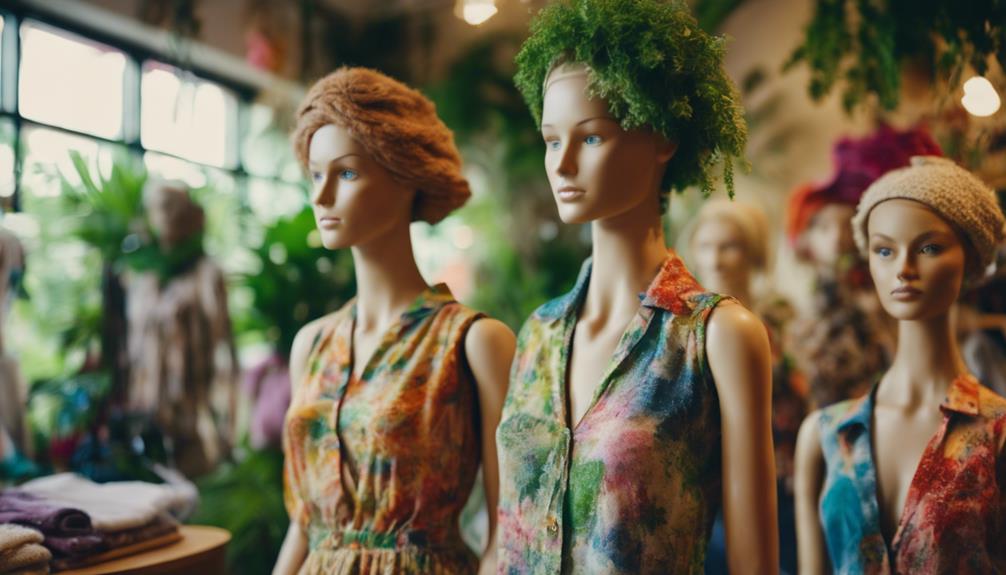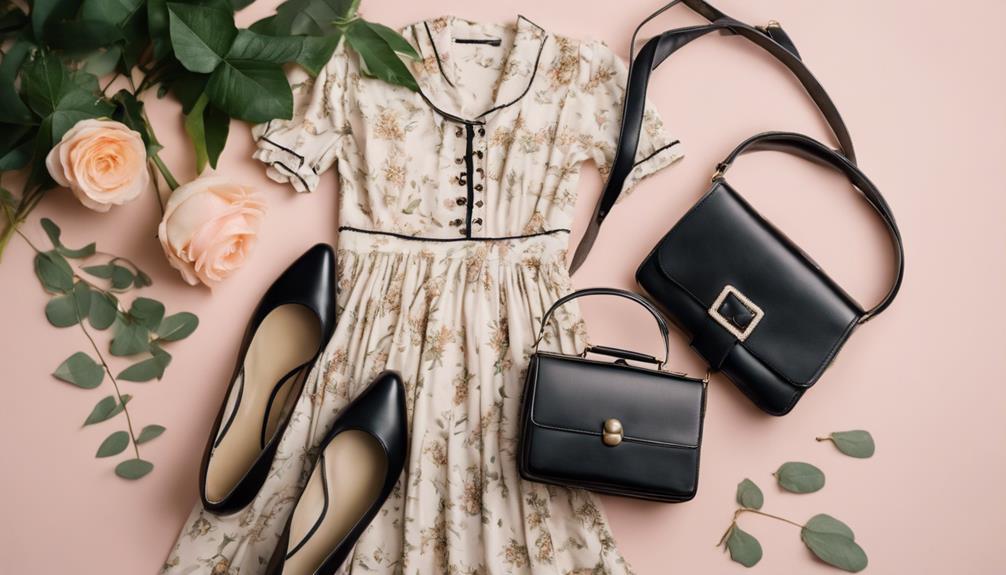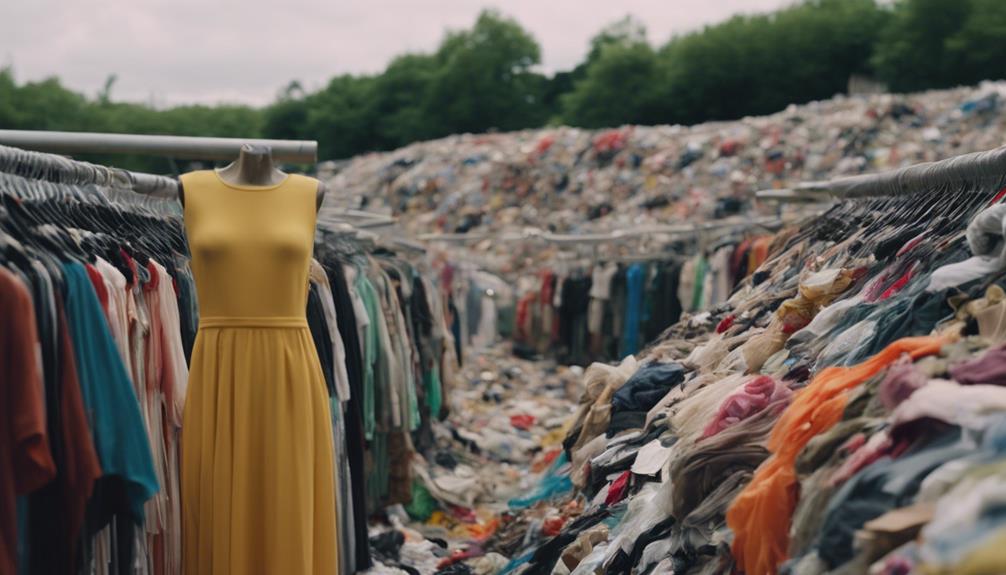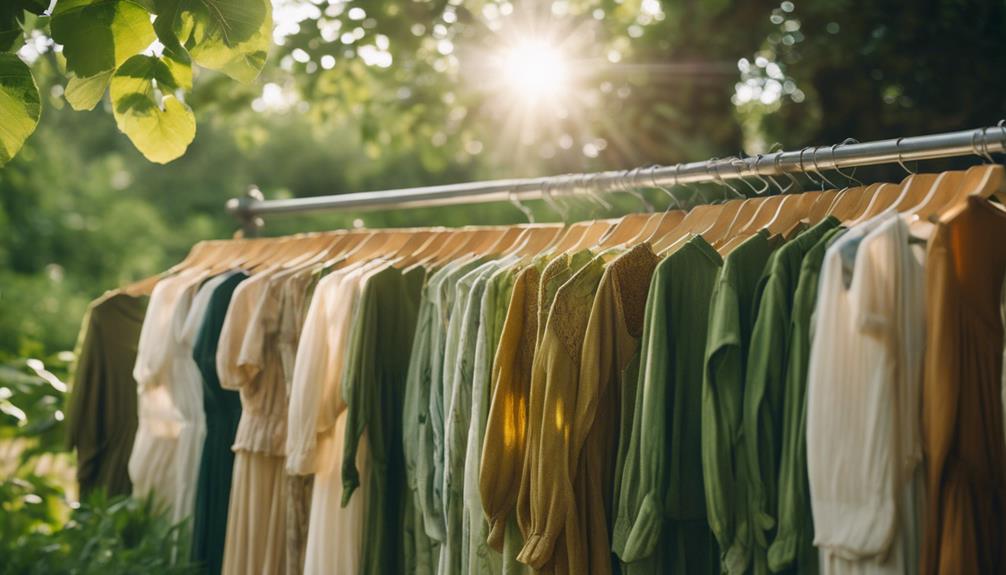Sustainable fashion is not just a passing trend; it is a smart choice for both you and the planet. By opting for sustainable alternatives, you are advocating for fair labor practices and helping to reduce environmental damage. The fashion industry is responsible for a significant 20% of global water pollution and is a major contributor to greenhouse gas emissions. Choosing high-quality, eco-friendly clothing means less waste and longer-lasting garments, ultimately saving you money over time. Additionally, selecting cruelty-free materials promotes animal welfare. Embracing sustainable fashion not only enhances your wardrobe, but also supports ethical practices. Interested in learning more about why this decision is important? There is so much more to explore!
Key Takeaways
- Sustainable fashion reduces environmental impact by minimizing water pollution and conserving resources through eco-friendly practices.
- It promotes ethical labor by ensuring fair wages and safe working conditions for garment workers.
- Investing in quality garments leads to long-term economic savings by reducing the need for frequent replacements.
- Supporting sustainable brands enhances animal welfare by encouraging cruelty-free alternatives and responsible sourcing.
Understanding Sustainable Fashion
Sustainable fashion isn't just a trend; it's a movement that prioritizes ethical production and environmental responsibility in the clothing industry. When you choose sustainable fashion, you're opting for clothing that's ethically made and environmentally friendly. This approach not only supports workers' rights but also protects our planet from the harmful impacts of conventional fashion practices.
The fashion industry is the second largest polluter globally, contributing considerably to water pollution and waste. By embracing sustainable fashion, you play a part in promoting a circular economy, which emphasizes recycling and reusing materials rather than relying solely on new resources. Did you know that a staggering 97% of clothing is produced from new materials? This highlights the need for change in how we produce and consume fashion.
Investing in quality over quantity is essential. When you select durable garments made from recyclable materials, you're reducing waste and minimizing your environmental footprint. By making these conscious choices, you not only support ethical practices but also help create a more sustainable future for the fashion industry and our planet.
Environmental Benefits
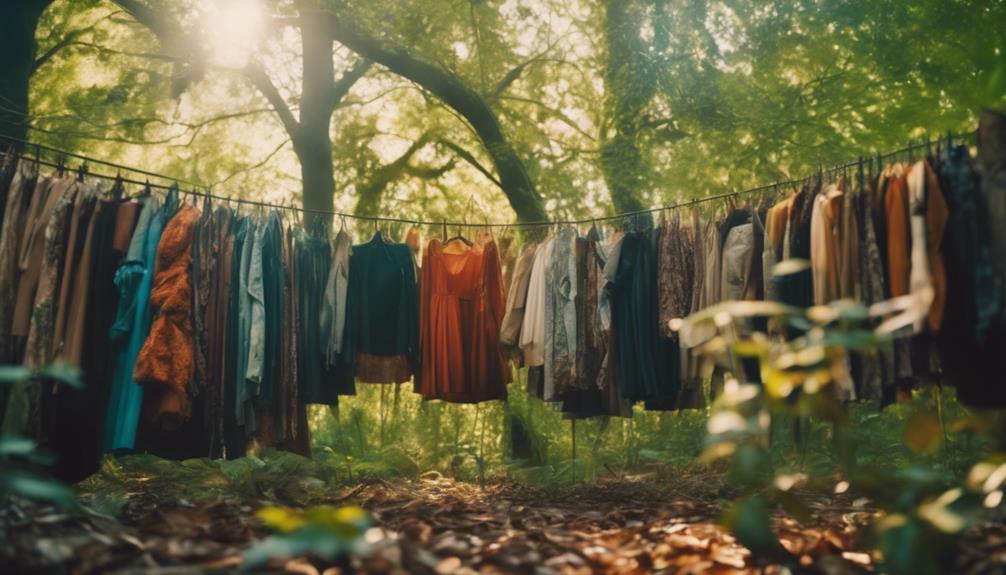
Choosing eco-friendly fashion greatly reduces water pollution and conserves essential resources in the clothing industry. The fashion industry is responsible for 20% of global industrial water pollution, making the switch to sustainable options vital. For instance, producing a conventional cotton T-shirt consumes around 2,700 liters of water, while sustainable fabrics like organic cotton can cut water usage by up to 91%.
Moreover, sustainable fashion practices can help mitigate the industry's significant contribution to greenhouse gas emissions, which accounts for 8% of the total. By opting for clothing made from recycled fibers, you lessen the pressure on virgin resources—like ECONYL®, which saves 70,000 barrels of oil and 57,100 tons of CO2 for every 10,000 tons produced.
Sustainable fashion also promotes a circular economy by encouraging recycling, upcycling, and thrifting, which helps divert 60% of clothing items from ending up in landfills within a year. By making conscious choices in your fashion purchases, you're not just dressing well; you're actively participating in reducing pollution and conserving valuable resources for future generations.
Ethical Labor Practices

When you choose sustainable fashion, you're not just selecting stylish clothes—you're also supporting fair wages and safe working conditions for workers.
It's essential to recognize the impact your choices can have on the lives of those in the fashion supply chain.
Fair Wages for Workers
Fair wages are essential for empowering workers and fostering ethical labor practices within the fashion industry. When you support sustainable fashion, you're not just buying clothes; you're investing in the well-being of workers who deserve humane treatment and fair compensation. Unlike fast fashion, which often exploits labor, sustainable brands prioritize fair wages, promoting economic opportunities for their workers.
| Aspect | Fast Fashion |
|---|---|
| Wages | Often below $3/day |
| Labor Practices | Exploitative |
| Worker Empowerment | Minimal |
| Supply Chain Transparency | Lacking |
| Aspect | Sustainable Fashion |
| Wages | Fair and livable |
| Labor Practices | Ethical and humane |
| Worker Empowerment | Significant |
| Supply Chain Transparency | High |
Safe Working Conditions
Safe working conditions are crucial for ensuring that every worker in the fashion industry is treated with dignity and respect, free from exploitation and harm. By choosing sustainable fashion, you support ethical labor practices that prioritize the welfare of workers.
Here are three key reasons why safe working conditions matter:
- Prevention of Modern Slavery: Sustainable fashion brands combat modern slavery by ensuring that workers aren't subjected to dangerous environments or unfair labor practices.
- Fair Wages: These brands endeavor to provide fair wages, allowing workers to support themselves and their families, contributing to greater economic stability.
- Transparency in Production: Eco-ethical brands operate certified factories that maintain transparency, holding themselves accountable for their labor practices.
Your consumer awareness plays an essential role in shaping the industry. By making informed purchasing decisions, you can encourage brands to adopt safe working conditions and ethical labor practices.
When you choose sustainable fashion, you're not just buying clothes; you're investing in a future where dignity, respect, and fairness are the norms in the fashion industry. Together, we can make a difference! Sustainable fashion cost may be higher initially, but the long-term benefits far outweigh the price tag. Not only does sustainable fashion help protect the environment and provide fair wages for workers, but it also allows consumers to make a statement with their clothing choices. By supporting sustainable fashion, we can pave the way for a more ethical and responsible industry that values both people and the planet.
Impact on Animal Welfare

The leather industry's annual slaughter of over 430 million animals raises serious ethical concerns about animal welfare in fashion. Many consumers mistakenly believe leather is just a by-product of the meat industry, but often, animals are specifically raised for their skins. By opting for sustainable fashion, you can help shift this narrative.
Sustainable fashion brands prioritize animal welfare by utilizing cruelty-free alternatives, such as ocean trash polyester and plant-based materials like pineapple leather. These materials not only repurpose agricultural waste but also align with ethical fashion practices that advocate for humane treatment of animals. When you choose these options, you support brands committed to ethical practices that respect animal rights.
Your consumer support plays an essential role in reducing harmful practices in the fashion industry. By consciously selecting clothing made from sustainable materials, you contribute to a positive impact on the environment and the lives of countless animals.
Embracing sustainable fashion isn't just a trend; it's a powerful statement that promotes compassion and responsibility in our purchasing choices. Together, we can create a fashion industry that values animal welfare and ethical practices.
Consumer Education and Responsibility

Understanding the lifecycle of fashion empowers you to make informed choices that reduce environmental impact and support ethical practices.
Consumer education is essential in shifting the narrative around sustainable fashion. When you grasp the implications of your purchasing decisions, you can take steps toward responsible choices that promote waste reduction and ethical labor practices.
Here are three key areas to reflect on:
- Quality Over Quantity: Investing in well-made clothing guarantees that items last longer, reducing the need to buy more frequently and combatting the fast fashion cycle.
- Environmental Awareness: Acknowledging that the fashion industry produces 20% of global wastewater helps you realize the importance of choosing brands that prioritize sustainable practices.
- Ethical Labor Practices: Supporting brands that assure humane working conditions and fair wages fosters social responsibility, guaranteeing that your fashion choices contribute positively to the community.
Long-Term Economic Advantages

Investing in sustainable fashion not only benefits the planet but also leads to significant long-term economic advantages for consumers and brands alike. When you choose high-quality garments, you're making a long-term view decision that often results in reduced costs. These durable pieces outlast cheaper alternatives, which means fewer replacements and less waste in the landfill.
Brands embracing sustainable practices see increased customer loyalty, with 66% of consumers willing to pay more for eco-friendly products. This commitment to sustainability enhances brand value and positions companies as market leaders, attracting a growing segment of eco-conscious shoppers.
Moreover, sustainable fashion stimulates local economies by supporting ethical production practices and fair wages, which strengthens community ties and reduces reliance on overseas cheap labor. By implementing these practices, brands also mitigate financial risks associated with regulatory changes and supply chain disruptions, making them more resilient in a shifting market.
In the end, choosing sustainable fashion isn't just an ethical choice; it's a smart financial decision that benefits you, the brands, and the communities involved. Embrace this movement for a more sustainable and economically sound future.
Frequently Asked Questions
Why Is Sustainable Fashion so Important?
Sustainable fashion's important because it reduces pollution, conserves resources, and guarantees ethical labor practices. By choosing sustainable options, you help create a healthier planet and support fair treatment for workers, making a positive impact on the industry. The purpose of sustainable fashion goes beyond environmental benefits; it aims to foster long-term change within the industry by encouraging conscious consumerism and reducing waste. By embracing this approach, we can shift away from the harmful practices of fast fashion and prioritize quality over quantity. Ultimately, the purpose of sustainable fashion is to create a more equitable and eco-friendly future for both people and the planet.
Why Do People Buy Sustainable Clothing?
Imagine choosing a meal that nourishes both your body and the planet. People buy sustainable clothing because it reflects their values, reduces waste, supports fair labor practices, and creates a healthier future for everyone involved.
Why Is It Important to Buy From Sustainable Brands?
Buying from sustainable brands matters because it helps reduce pollution, supports ethical labor practices, and cuts down waste. You're making a positive impact on the environment and ensuring fair treatment for workers in the fashion industry.
What Does Sustainable Fashion Mean to You?
Sustainable fashion means you're choosing quality over quantity, supporting ethical practices, and caring for the planet. It's about making mindful decisions that reflect your values, embracing style that lasts, and nurturing a more sustainable future.
Conclusion
Embracing sustainable fashion isn't just about looking good; it's a vibrant tapestry of choices woven from environmental care, ethical labor, and animal welfare.
By choosing wisely, you're not just dressing your body but also nurturing the planet and its people.
Each purchase becomes a brushstroke in the masterpiece of responsible living, where your wardrobe reflects your values.
So, step into a world where your fashion choices ripple out, creating waves of positive change for generations to come.
